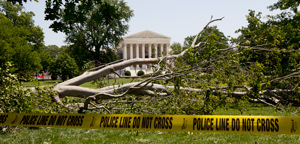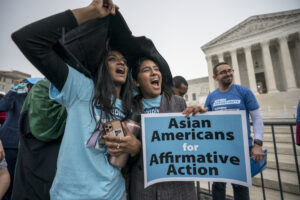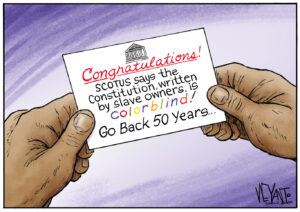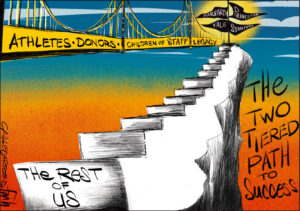Supreme Court Preview: A Storm Is on the Horizon
As the war clouds gather over Washington in preparation for airstrikes against Syria, the nine justices who sit on the Supreme Court have returned from summer break and are preparing to kick up a legal storm of their own as they resume their quest to radically transform federal law and the Constitution. As the war clouds gather over Washington, the nine justices who sit on the Supreme Court are preparing to kick up a legal storm of their own.
They’re b-a-c-k! As the war clouds gather over Washington in preparation for airstrikes against Syria, the nine justices who sit on the Supreme Court have returned from summer break and are preparing to kick up a legal storm of their own as they resume their quest to radically transform federal law and the Constitution.
To be sure, there are four moderate to liberal voices on the high court, led by the frail but courageous Ruth Bader Ginsburg, who at the tender age of 80 has become the conscience of the tribunal. But with precious few detours, the court has become, in Ginsburg’s words, “one of the most activist courts in history.”
So, as the court readies for the commencement of oral arguments next month in a brand new term, what can we expect from the gang of nine? Here are three cases slated for decisions on the merits with the potential to cause lasting social and political harm, and three more with sufficient weight to be added to the docket as the current term unfolds:
Affirmative Action (Schuette v. Coalition to Defend Affirmative Action)
From the great state of Michigan, set for oral argument on Oct. 15, comes this new challenge to the consideration of race in public higher-education admissions programs. Last term, the court dealt a mild setback to colleges that have chosen to adopt race-conscious programs when it remanded a case involving the University of Texas’ admissions plan back to a federal appellate panel for reconsideration under a more stringent and hard-to-meet constitutional test (Fisher v. Texas). This time, the question before the court is far more extensive: whether a state, by a legislative act or popular initiative, can prohibit affirmative action even if a university system chooses on its own to implement or maintain a race-based program. In 2006, Michigan voters ratified Proposition 2, which outlawed such programs. The U.S. Court of Appeals for the 6th Circuit, however, subsequently declared the proposition unconstitutional.
Currently, the country is sharply divided on the issue, as California and five other states besides Michigan, accounting for 28 percent of college admissions nationwide, have also outlawed the consideration of race. The 9th Circuit Court of Appeals, unlike the 6th, has upheld California’s ban. The Schuette case will resolve the split.
Since liberal Justice Elena Kagan has recused herself from deliberations due to conflicts arising from her tenure as solicitor general, the court’s five conservatives appear to have the perfect vehicle to drive another nail into the heart of race-conscious plans. The conservative majority may not be ready to adopt the ever-vitriolic Justice Clarence Thomas’ characterization of affirmative action as a latter-day form of Jim Crow, but in the end, it is likely to vote alongside Thomas, who in the cruelest of ironies was a beneficiary of affirmative action at Yale Law School.
Environmental Protection (Environmental Protection Agency v. EME Homer City Generation)
At the request of the Obama administration, the American Lung Association and environmental groups, the court has agreed to take up a federal appellate ruling that had invalidated the Environmental Protection Agency’s Cross-State Air Pollution rule, which sought to enforce the Clean Air Act by setting much-needed limits on nitrogen oxides and sulfur dioxide emissions from coal-fired power plants in 28 eastern states.
Although some observers see the court’s decision to hear the EME case as a sign of support for the EPA, the Roberts court has a dismal record on environmental protection, aligning itself time and again on the side of corporate interests and polluters.
In 2008, in Exxon v. Baker, the court voted 5-3 to reduce the punitive damages awarded to the victims of the Valdez oil spill from $2.5 billion to $500 million, a mere pittance of the oil giant’s annual profits, leaving more than 30,000 people whose livelihoods and community were destroyed by the disaster with a sum completely inadequate to make up for their losses.
Last term, the court continued its beneficence toward big business, ruling unanimously that farmers could not use Monsanto’s patented genetically altered soybeans to create new seeds without paying the company a hefty fee. Expect more of the same going forward, this time on behalf of coal companies.
Federal Election Law (McCutcheon v. Federal Election Commission)
Dubbed by some commentators as Citizens United 2.0, this mean-spirited piece of litigation was generated by the Republican National Committee and Alabama businessman Scott McCutcheon. Together, they seek to overturn current federal law that limits the aggregate amount of money any single person can contribute directly to candidates for federal office, political parties and political committees to $123,000 in any two-year election cycle.
As the New York-based Brennan Center for Justice has argued in an amicus (friend of the court) brief filed in the case, the aggregate contribution limits are designed to inhibit political corruption. But as the Roberts court demonstrated with the original Citizens United ruling in 2010, it views campaign contributions as a form of individual expression protected under the First Amendment.
In 2012, the court signaled its intention to elevate this perverse interpretation of the First Amendment to a new level of rigidity as it overturned a 100-year-old Montana law that prohibited corporations from spending funds to influence the outcome of state elections (American Tradition Partnership v. Bullock). In the United States of Corporate America, under the judicial stewardship of Chief Justice John Roberts, money talks, as loudly as possible.Three Cases Vying to Make the A-List
Abortion Rights (Cline v. Oklahoma Coalition for Reproductive Justice)
In 2011, Oklahoma enacted a law that would impose severe restrictions on the use of RU-486 (also known as mifepristone or Mifeprex) and any other “abortion-inducing drugs” as alternatives to pregnancy-terminating surgery. Although the Roberts court had agreed in June to resolve the law’s validity, it later sent the case back to the Oklahoma Supreme Court to clarify the meaning of the statute.
If the clarifications are delivered by January, the Roberts court may schedule the case for oral argument before the current term ends. Although the case lacks the potential to overturn Roe v. Wade, a resolution in favor of Oklahoma could have major implications for the 16 states that have passed similar laws, sending yet another signal that Roe’s days may be numbered.
Voting Rights (League of Women Voters of North Carolina et al. v. North Carolina, United States v. Texas)
Within days of the court’s decision last term in Shelby County v. Alabama, gutting the historic Voting Rights Act, several states, including Texas and North Carolina, reinstated various voting suppression schemes — including gerrymandered redistricting plans, harsh voter ID requirements and new curbs on same-day voting — that never would have passed muster under the act’s now eviscerated “preclearance” provisions. Those provisions required states and localities with a legacy of electoral discrimination to obtain advance approval from the Justice Department or the courts before implementing new voting laws and procedures.
Despite the broad sweep of Shelby’s holding, the Justice Department quickly brought suit to declare the Texas maneuvers unconstitutional while the ACLU initiated an action to block the North Carolina measures. Both suits rely on Section 2 of the Voting Rights Act, which prohibits discrimination generally in elections, as well as the rarely invoked Section 3 of the act, which permits a court to order continuous monitoring of a jurisdiction found to have engaged in intentional discrimination in much the same fashion as the old preclearance procedures.
Given the novelty of the Section 3 claims and in view of the Supreme Court’s skepticism about the continued need for federal election oversight and the high political stakes involved in the struggle over voter suppression, one or both cases stand a strong chance of being added to the docket.
Indefinite Detention under the National Defense Authorization Act (Hedges v. Obama)
In January 2012, Pulitzer Prize-winning journalist and Truthdig columnist Chris Hedges and other activists, including Noam Chomsky and Daniel Ellsberg, filed a federal lawsuit challenging the constitutionality of Section 1021(b)(2) of the National Defense Authorization Act (NDAA), which allows for indefinite detention by the U.S. military of people, including potentially U.S. citizens, “who are part of or substantially support Al Qaeda, the Taliban or associated forces engaged in hostilities against the United States.”
To the surprise of many observers, U.S. District Judge Katherine Forrest, an Obama appointee sitting in New York City, issued a permanent injunction, declaring the detention section unconstitutional. And then, reality set in. On July 17 of this year, the 2nd U.S. Circuit Court of Appeals lifted the injunction, holding that the plaintiffs lacked standing to bring a legal challenge to the detention provision.
Hedges and his fellow litigants now plan to seek Supreme Court review. Statistically, their chances of persuading the Roberts court to take another look are slim, as the tribunal agrees to hear roughly 1.2 percent of the petitions for review filed annually.
Even if Hedges beats the odds and entices the high court to grant review, the prospects for a victory on the merits are also slim, because the 2nd Circuit based its dismissal order on the case of Clapper v. Amnesty International, decided by the Supreme Court only in February.
The Clapper plaintiffs tried to overturn a key section of the Foreign Intelligence Surveillance Act dealing with emails and other forms of electronic communications. In a 5-4 majority opinion written by Justice Samuel Alito, the court dismissed their complaint, reasoning that none of the organizations bringing the suit could prove their emails in fact had been intercepted and, therefore, that none had suffered the actual legal harm needed to satisfy the Roberts court’s strained definition of the “standing” required to prosecute federal lawsuits. A similar fate likely awaits Hedges and his co-plaintiffs should the Supreme Court decide to add their case to the docket.
As the war clouds over Washington grow darker by the day, now would be the ideal time for a full, substantive judicial review of the indefinite detention provisions of the NDAA. But short of a miracle in the form of a sudden political come-to-Jesus conversion by at least one of the high court’s conservatives, that’s not going to happen. Not this term, and not for the foreseeable future.
Your support matters…Independent journalism is under threat and overshadowed by heavily funded mainstream media.
You can help level the playing field. Become a member.
Your tax-deductible contribution keeps us digging beneath the headlines to give you thought-provoking, investigative reporting and analysis that unearths what's really happening- without compromise.
Give today to support our courageous, independent journalists.






You need to be a supporter to comment.
There are currently no responses to this article.
Be the first to respond.